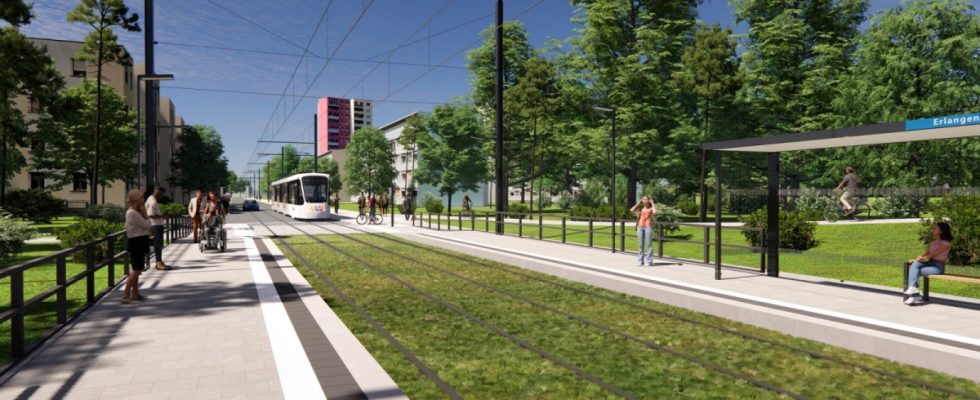The dispute over the city-surrounding railway (StUB), which is supposed to connect the cities of Nuremberg, Erlangen and Herzogenaurach, is becoming an issue in the Bavarian state parliament. The Greens and SPD factions submitted urgent motions to the plenary session on Tuesday evening. One motion calls for the state parliament to commit to the currently largest tram project in the republic, the other calls on the state government to position itself on the importance of the infrastructure project for the region and its science and economy. Both applications were referred to the Transport Committee, which will probably meet next week. There was initially no debate on the StUB, including members of the CSU and FW government factions.
The StUB – estimated to cost 730 million euros – is considered fundamental for the research institutions and global corporations in the region; among other things, it is intended to connect a new Siemens district. The municipal project of the century was the topic of a meeting in 2013 between the state government – including the then minister and current Prime Minister Markus Söder (CSU) – with the Siemens leadership. But recently, largely at the instigation of the CSU, the Erlanger city council initiated a council proposal for StUB – the local CSU criticized the costs and route, the benefits did not justify the effort, it was said. On June 9th, citizens will decide whether the three-city tram should be built as currently planned.
Back in 2016, more than 60 percent of Erlangen residents voted for the StUB in a referendum. Since then, a double-digit million sum has been invested in its planning, and the city of Nuremberg has already completed its section of the route. Siemens has invested one billion euros in the Erlangen location, and 20,000 people are expected to work at the new campus.
If Erlangen were to vote no, the project would probably have to be buried in this dimension – which would mean that the next major project in Franconia would be canceled: in 2023, Deutsche Bahn had buried plans for an ICE factory.
There has recently been no clear statement from the state government, particularly on the promises made in 2013. At the request of the SZ The Ministry of Transport responded to Söder’s State Chancellery and called the StUB an “important project for the Bavarian State Government” and was committed to supporting it. However, the prerequisite is “a positive vote from the region”. The state leadership of the CSU sends messages addressed to them SZ-Questions unanswered for a week and a half.
The SPD motion calls on the state government to “commit at all levels to the rapid implementation of the infrastructure project.” It’s about a reliable basis for companies like Siemens, Adidas, Puma and Schaeffler as well as the Friedrich-Alexander University Erlangen-Nuremberg. The StUB is “one of the most efficient and lucrative new building projects in all of Germany” and has “exemplary character”, not least because of the promised assumption of well over half of the costs by the federal and state governments. The planned cycle with increased traffic during rush hour creates a “climate-friendly alternative” to overloaded highways. The state government and the parties represented in the state parliament must therefore do everything possible to ensure that the referendum is in favor of the project.
The Greens, in turn, are demanding answers from the state government. For example, on the questions of how a failure of the StUB would affect the university’s location decisions, the Siemens campus and the location as a whole; or what significance the State Chancellery today attaches to the declaration of principles made in 2013, on the basis of which Siemens made massive investments.

